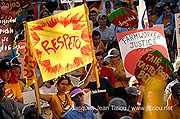January 6, 2009
 2008: Five stories that defined a momentous year in the Campaign for Fair Food…
2008: Five stories that defined a momentous year in the Campaign for Fair Food…
Whether it was the year in national news — from the election of the country’s first African American president to the worst economic crash since the Great Depression — or just the year in Fair Food — from three stunning new victories in the campaign to one of the most disturbing slavery cases in recent memory — 2008 was one for the history books.
We’ve sifted through the past twelve months and have identified what we consider the top five stories from a remarkably eventful year. So, sit back, grab a cup of coffee, and enjoy a look back at the highlights of a year that’s going to be one hard act to follow!
And then get back up and get ready to do it all again — 2009 is waiting…
*******************
Campaign For Fair Food victories just keep coming!… In twelve short months, we managed to add three more major retail food corporations — Burger King, Whole Foods, and Subway — to the growing list of companies that are now committed to the principles of Fair Food.
Burger King was first, after an intense (and at turns bizarre) year-long campaign. National media covered the odyssey, which included an historic march on Burger King headquarters in Miami, a national petition drive against modern-day slavery, and the eventual firing of  two executives. In May, Burger King changed course, apologizing for negative statements it made about the CIW and forging a strong agreement to improve wages and working conditions for the workers who pick its tomatoes. Burger King executives joined CIW representatives and Senator Bernie Sanders for a signing ceremony at the US Capitol.
two executives. In May, Burger King changed course, apologizing for negative statements it made about the CIW and forging a strong agreement to improve wages and working conditions for the workers who pick its tomatoes. Burger King executives joined CIW representatives and Senator Bernie Sanders for a signing ceremony at the US Capitol.
Whole Foods, the leading organic and natural food supermarket chain, was next (and the first to voluntarily adopt the Fair Food standards), marking the birth of a collaboration that holds great promise for establishing the principles of Fair Trade in the mainstream of US agriculture. 2009 will tell whether that promise is realized or if there is more work to be done.
Finally, Subway — the largest fast-food purchaser of Florida tomatoes — joined the ranks of multi-billion dollar restaurant companies agreeing to pay more for their tomatoes so that workers can earn a fairer wage. Subway also took the principles of Fair Food to a new level in its own way, agreeing to extend the participatory, complaint-based code of conduct to its entire supply chain, not just tomatoes.
With Subway’s signing, all four of the world’s largest restaurant companies are now working to eradicate slavery and exploitation in Florida’s agricultural industry. The fast-food industry has spoken (though, of course, a few stragglers remain, with Chipotle at the top of that list, joined there by companies like Wendy’s and Quiznos…). The Campaign for Fair Food can now turn in 2009 to the supermarket and foodservice industries — companies like Publix, Safeway, and WalMart, Sodexo and Aramark — to demand the same higher standards from those major purchasers of Florida tomatoes. Stay tuned in the months ahead for news from the expanding campaign.
Slavery in the news… Since the late 1990’s, Florida’s fields have produced a steady stream of slavery prosecutions, and 2008 was no exception. But what made the slavery operation that came to  light in the past year — resulting in the conviction of a family of farm bosses for holding workers against their will right here in Immokalee — stand out were the disturbing details of unmitigated brutality suffered by the workers, including being chained and locked inside uhaul trucks at night, and beaten by their bosses during the day.
light in the past year — resulting in the conviction of a family of farm bosses for holding workers against their will right here in Immokalee — stand out were the disturbing details of unmitigated brutality suffered by the workers, including being chained and locked inside uhaul trucks at night, and beaten by their bosses during the day.
Even more disturbing, perhaps, was the dismissive reaction by a spokesperson for Florida’s Governor Crist when asked for comment on the case by a reporter from Ft. Myers. The spokesperson — Mr. Terence McElroy of the Florida Department of Agriculture and Consumer Services — appeared to downplay the significance of forced labor in the state’s fields, not once, but twice. His statements provoked an immediate outcry by human rights, religious, labor, student, and community organizations and leaders across the country.
Among those troubled by Mr. McElroy’s statements — and the governor’s own silence and inaction — was the honorable Mary Robinson (right), former United Nations High Commissioner for Human Rights, who wrote in a public statement:
“… Slavery persists when government leaders fail to take the necessary action to prevent it. Taking preventive action is a human rights obligation of local, state and national governments… I support the Coalition of Immokalee Workers and others in urging Governor Crist to take immediate steps to combat modern-day slavery in Florida agriculture.” See President Robinson’s full statement here
As 2009 begins, Governor Crist has yet to speak on the subject of slavery in his state’s fields.
The United States Senate enters the ring… In an unprecedented move, a US Senate Committee held a hearing in Washington, DC, on the exploitation of farm labor in Florida’s tomato fields. The hearing was a powerful indictment of business as  usual in the Florida agricultural industry. The senators gathered for the start of the hearing — Sen. Bernie Sanders (left), Sen. Kennedy, Sen. Richard Durbin, and Sen. Sherrod Brown — opened the day’s proceedings with blistering denunciations of the conditions reported in Florida’s fields. Typical of those opening statements were remarks by Sen. Sanders, who told the hearing, “In America today we are seeing a race to the bottom, the middle class is collapsing, poverty is increasing. What I saw in Immokalee is the bottom in the race to the bottom.”
usual in the Florida agricultural industry. The senators gathered for the start of the hearing — Sen. Bernie Sanders (left), Sen. Kennedy, Sen. Richard Durbin, and Sen. Sherrod Brown — opened the day’s proceedings with blistering denunciations of the conditions reported in Florida’s fields. Typical of those opening statements were remarks by Sen. Sanders, who told the hearing, “In America today we are seeing a race to the bottom, the middle class is collapsing, poverty is increasing. What I saw in Immokalee is the bottom in the race to the bottom.”
The hearing was not the only time representatives of the US Senate got involved in the battle for Fair Food in 2008. In March, Sen. Durbin and Sen. Sanders were joined by Rep. John Conyers and Rep. Dennis Kucinich, AFL-CIO President John Sweeney, CIW members and representatives from dozens of religious, student, labor, and human rights organizations for a stirring public signing ceremony in the shadow of the Capitol building to kick-off the CIW’s nationwide petition Campaign to End Modern-Day Slavery! Over 85,000 signatures collected during the petition campaign were handed in to Burger King headquarters in a moving protest the following April.
protest the following April.
And, of course, Senate interest in the human rights crisis in Immokalee began with Senator Sanders’ visit to Immokalee in January of 2008 (right) . Visiting just as a federal grand jury indicted six people in Immokalee for the Navarrete slavery case, Sen. Sanders declared in a press conference wrapping up his two-day stay in town:
“The headline in today’s newspaper says all that has to be said. In the year 2008, in the United States of America, slavery exists. Human beings are being forced to work against their will, are being beaten, are being denied their most basic freedoms. This should not be happening in the United States in 2008. This exploitation must end.”
As we begin 2009, Senator Sanders’ words at the Senate hearing ring with promise for a continued collaboration with the Campaign for Fair Food: ”We have broken ground on this issue. We are going to stay on this issue.”
CIW enters the world of sustainable food… In what amounted to a whirlwind romance, the CIW and the burgeoning sustainable food movement met in 2008 and decided that we had much in common.
While the Campaign for Fair Food has since its inception focused almost exclusively on plantation-scale, conventional agricultural producers who own thousands of acres in multiple states and hire and exploit enormous crews of migrant farmworkers, the sustainable food movement has traditionally been concerned with family-scale farms, local produce, and the growing organic market. Those are the reasons the CIW and the leading lights of the sustainable food movement have largely operated in separate worlds over the past decade.
 But in 2008 that all changed, for several reasons. First, when the Campaign for Fair Food began to focus on Chipotle and Whole Foods, it crossed over into sustainable food territory, taking on two giants of the retail side of sustainable food that invest heavily in marketing their claims to “food with integrity” (in the words of Chipotle’s memorable marketing slogan). Second, the sustainable food movement is evolving, and part of that evolution is a growing awareness that, quite simply, food can’t be sustainable if it isn’t also fair — or, in the more eloquent words of “Fast Food Nation” author Eric Schlosser, “Does it matter whether an heirloom tomato is local and organic if it was harvested with slave labor?” As a result of that emerging awareness, the CIW was invited to speak at several major sustainable food gatherings throughout the year, including the granddaddy of them all, the Slow Food conference in San Francisco. We even got a mention in the New York Times Magazine’s annual food issue! Finally, our agreement with Whole Foods and its commitment to developing credible Fair Trade standards for Whole Foods’ domestic agricultural suppliers creates a possibility that never before existed in the Florida tomato industry — an opportunity for small-scale, sustainable producers to break into the large-scale retailer market in a meaningful way.
But in 2008 that all changed, for several reasons. First, when the Campaign for Fair Food began to focus on Chipotle and Whole Foods, it crossed over into sustainable food territory, taking on two giants of the retail side of sustainable food that invest heavily in marketing their claims to “food with integrity” (in the words of Chipotle’s memorable marketing slogan). Second, the sustainable food movement is evolving, and part of that evolution is a growing awareness that, quite simply, food can’t be sustainable if it isn’t also fair — or, in the more eloquent words of “Fast Food Nation” author Eric Schlosser, “Does it matter whether an heirloom tomato is local and organic if it was harvested with slave labor?” As a result of that emerging awareness, the CIW was invited to speak at several major sustainable food gatherings throughout the year, including the granddaddy of them all, the Slow Food conference in San Francisco. We even got a mention in the New York Times Magazine’s annual food issue! Finally, our agreement with Whole Foods and its commitment to developing credible Fair Trade standards for Whole Foods’ domestic agricultural suppliers creates a possibility that never before existed in the Florida tomato industry — an opportunity for small-scale, sustainable producers to break into the large-scale retailer market in a meaningful way.
The nascent relationship between the Campaign for Fair Food and the broader sustainable food movement only stands to deepen and grow more fruitful in the year ahead.
Corporate espionage… The corporate misconduct in the Burger King campaign — exposed thanks to some truly outstanding reporting by Amy Bennett Williams, a reporter from the Ft. Myers News-Press ( here’s an example of one of her many articles on the topic), coupled with Eric Schlosser’s unflagging support for the Campaign for Fair Food, this time expressed in a hard-hitting op/ed in the New York Times entitled “Burger with a side of spies” — gave us all a disturbing glimpse into the corporate playbook on response to consumer activism. But it could have easily gone undetected if it weren’t for a rare combination of good luck and hard work. Coverage of the whole sordid episode ran far and wide, and helped bring about a long-overdue change in course by the world’s second largest hamburger chain. Burger King’s decision to join the call for Fair Food in turn helped the campaign gain further traction and secure two more victories in 2008.
here’s an example of one of her many articles on the topic), coupled with Eric Schlosser’s unflagging support for the Campaign for Fair Food, this time expressed in a hard-hitting op/ed in the New York Times entitled “Burger with a side of spies” — gave us all a disturbing glimpse into the corporate playbook on response to consumer activism. But it could have easily gone undetected if it weren’t for a rare combination of good luck and hard work. Coverage of the whole sordid episode ran far and wide, and helped bring about a long-overdue change in course by the world’s second largest hamburger chain. Burger King’s decision to join the call for Fair Food in turn helped the campaign gain further traction and secure two more victories in 2008.
And to the company’s credit, in the public statement accompanying our agreement, Burger King unequivocally recognized that its initial response to the campaign was wrong, that “the Florida tomato harvesters are in need of better wages, working conditions and respect for the hard work they do,” and that “if the Florida tomato industry is to be sustainable long-term, it must become more socially responsible.”
Unfortunately, the strategic reasoning behind the company’s initial missteps, the whole idea of attacking the messenger rather than taking an honest, hard look at the message itself — even after that message has been vetted by your competitors from every imaginable angle already — is by no means unique to Burger King. It appears, rather, to be an all too common default strategy for corporate executives when confronted with public criticism of their company’s business practices. But history is clearly not on the side of those who would defend the status quo in Florida agriculture.
We can only hope that, in the coming year, the companies in the path of the Campaign for Fair Food realize that taking action to help end the long nightmare of farmworker exploitation is not only the most ethical thing to do, but is in fact the best business decision, as well.
If that happens, 2009 will be an even better year than 2008…
